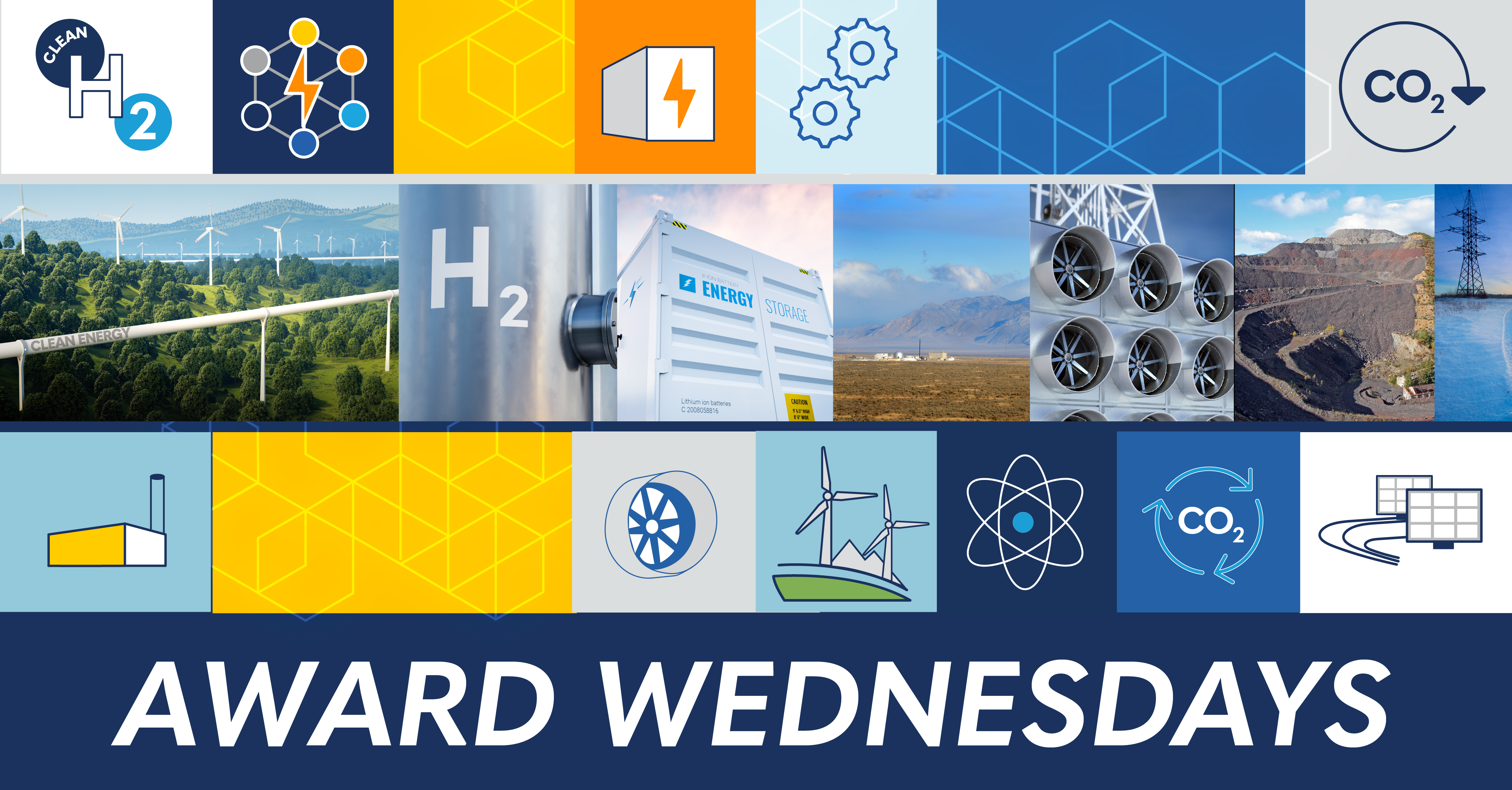This week's awards: CEML's MILESHIGH Project; IDP's Hybrid Electric Glass Furnace Project, Low-Emissions, Cold-Agglomerated Iron Ore Briquette Production, and Star e-Methanol projects.
Office of Clean Energy Demonstrations
December 11, 2024
On Wednesdays, OCED will announce the latest projects that have successfully completed award negotiations. OCED will only issue an Award Wednesday notification on weeks when an award has been finalized.
Clean Energy Demonstration Program on Current and Former Mine Land
MILESHIGH Project
OCED awarded the MILESHIGH Project, led by Freeport Minerals Corporation, with more than $3.5 million (of the total project federal cost share of up to $80 million) to begin Phase 1 activities. The project plans to demonstrate the technical viability of direct-use, geothermal, clean heat to enable low-emission recovery of copper from previously mined material. Located at FMC's Morenci and Safford active copper mines in southeast Arizona, this project would use the area’s naturally occurring geothermal heat to offset the need for fossil-based heat to increase residual copper yields. FMC also plans to install and operate a microgrid and a utility-scale battery energy storage system (BESS) at the active Morenci copper mine to increase energy resilience and reliability both onsite and for the surrounding community. The MILESHIGH project plans to decrease the mines’ reliance for onsite fossil fuel backup generators and eliminate the need to add new natural gas-fired sources of heat to reduce the mines’ greenhouse gas emissions and improve the energy and climate resilience of local communities. During Phase 1, Freeport Minerals Corporation will make substantial progress on business agreements, conduct a risk assessment and prepare for local, state, and federal permitting.
View the project fact sheet and community benefits commitments summary here. Learn more about engagement opportunities here.
Industrial Demonstrations Program
Hybrid Electric Glass Furnace Project
OCED awarded the Hybrid Electric Glass Furnace Project, led by Gallo Glass Company, with more than $2.7 million (of the total project federal cost share of up to $75 million) to begin Phase 1 activities. The project plans to install a demonstration hybrid electric furnace to reduce natural gas use by up to 70%, increase recycled content in its glass bottle production process, and demonstrate cradle-to-gate reductions in carbon intensity of more than 40% compared to traditional gas-powered furnaces. Gallo Glass Company anticipates selling low-carbon glass bottles as a premium option, contributing to the decarbonization of a large portion of glass packaging for California’s wine and spirits industry. During Phase 1, Gallo Glass Company will perform detailed engineering for the project, assess the feasibility of clean or low-carbon power sources, provide documentation and reports necessary for OCED to complete the National Environmental Policy Act review, and continue engagement activities with the community, partners, and stakeholders.
View the project fact sheet and community benefits commitments summary here. Learn more about engagement opportunities here.
Low-Emissions, Cold-Agglomerated Iron Ore Briquette Production
OCED awarded the Low-Emissions, Cold-Agglomerated Iron Ore Briquette Production project, led by Vale USA, with more than $3.8 million (of the total project federal cost share of up to $282.9 million) to begin Phase 1 activities. The project plans to build a first-of-its-kind iron ore briquette production facility in the U.S. using a low-emissions alternative to traditional iron ore pellets as a feedstock for metallics and steel production. This transformative technology intends to achieve deep emissions reductions by decarbonizing iron ore agglomeration and reducing the need for industrial heat, resulting in a flexible product that can be used at both direct-reduced and blast furnace ironmaking routes. By demonstrating this technology for this project with briquettes that will be customized for use in direct-reduced iron production, Vale USA would reduce CO2 emissions by an estimated 60% and reduce some criteria air pollutants like sulfur oxides (SOx) by roughly 99%, resulting in improved air quality, as well as reducing water usage. During Phase 1 of the project, Vale USA will conduct preliminary engineering design, provide documentation and reports necessary to complete the National Environmental Policy Act review, and engage community and labor stakeholders.
View the project fact sheet and community benefits commitments summary here. Learn more about engagement opportunities here.
Star e-Methanol
OCED awarded the Star e-Methanol project, led by Orsted Star P2X LLC (Ørsted), with more than $3.4 million (of the total project federal cost share of up to $99 million) to begin Phase 1 activities. The project plans to use captured carbon dioxide from a local industrial facility to produce e-methanol and reduce greenhouse gas emissions from hard-to-electrify sectors like shipping. Ørsted’s facility is estimated to produce up to 300,000 metric tons of e-methanol per year and would reduce greenhouse gas emissions by 80% or more compared to traditional production methods. This project expects to demonstrate both the supply and demand for clean hydrogen-derived alternative fuels for the marine shipping and transportation sector. These sectors currently rely on energy-intensive fossil-derived fuels to transport the world’s goods. Ørsted is also participating in the Gulf Coast Hydrogen Hub (HyVelocity), a separate OCED award under the Regional Clean Hydrogen Hubs program, to produce the hydrogen for the Star e-Methanol project. During Phase 1 of the project, Ørsted will complete initial conceptual and engineering studies for the various aspects of the project, provide documentation and reports necessary to complete the National Environmental Policy Act review, and engage community and labor stakeholders.
View the project fact sheet and community benefits commitments summary here. Learn more about engagement opportunities here.



